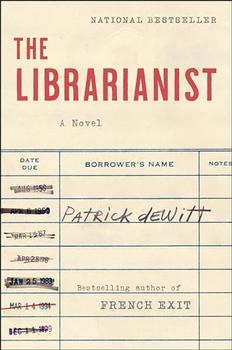Summary | Excerpt | Reviews | Beyond the book | Read-Alikes | Genres & Themes | Author Bio

A Novel
by Patrick deWittFrom bestselling and award-winning author Patrick deWitt comes the story of Bob Comet, a man who has lived his life through and for literature, unaware that his own experience is a poignant and affecting narrative in itself.
Bob Comet is a retired librarian passing his solitary days surrounded by books and small comforts in a mint-colored house in Portland, Oregon. One morning on his daily walk he encounters a confused elderly woman lost in a market and returns her to the senior center that is her home. Hoping to fill the void he's known since retiring, he begins volunteering at the center. Here, as a community of strange peers gathers around Bob, and following a happenstance brush with a painful complication from his past, the events of his life and the details of his character are revealed.
Behind Bob Comet's straight-man façade is the story of an unhappy child's runaway adventure during the last days of the Second World War, of true love won and stolen away, of the purpose and pride found in the librarian's vocation, and of the pleasures of a life lived to the side of the masses. Bob's experiences are imbued with melancholy but also a bright, sustained comedy; he has a talent for locating bizarre and outsize players to welcome onto the stage of his life.
With his inimitable verve, skewed humor, and compassion for the outcast, Patrick deWitt has written a wide-ranging and ambitious document of the introvert's condition. The Librarianist celebrates the extraordinary in the so-called ordinary life, and depicts beautifully the turbulence that sometimes exists beneath a surface of serenity.
Bob is not some loveless, angry Houellebecq character; his aloneness doesn't read as a failure to him or to the reader. Quietude and reading are his life, not an escape from it. Instead of taking solace in his ability to turn pain into art, using books to justify his loneliness, Bob turns to literature to recognize himself in others, and to not be alone. His reading is described as "a living thing, always moving, eluding, growing, and he knew it could not end, that it was never meant to end"—a beautiful portrayal that makes this lifetime activity sound closer to the creation of art than what people often call the "consumption" of it...continued
Full Review
 (1028 words)
(1028 words)
(Reviewed by Chloe Pfeiffer).
 Patrick deWitt's The Librarianist depicts main character Bob Comet's childhood experience of being driven home by a sheriff, after having run away, on the day that officially marked the end of World War II.
Patrick deWitt's The Librarianist depicts main character Bob Comet's childhood experience of being driven home by a sheriff, after having run away, on the day that officially marked the end of World War II.
May 8, 1945 is the day when German troops throughout Europe surrendered to the Allies, and is known as V-E Day (Victory in Europe Day). Millions of people rejoiced at the news that the war—which had lasted six years and cost millions of lives, including those of the six million Jews who had been murdered in the Holocaust—was over.
In towns and cities throughout Europe and other parts of the world, including London, Paris and Copenhagen, there were emotional public celebrations, parades, dancing and singing, ...

If you liked The Librarianist, try these:

by Michael Deagler
Published 2025
Like a sober, millennial Jesus' Son, Michael Deagler's debut novel is the poignant confession of a recovering addict adrift in the fragmenting landscape of America's middle class.

by Hisham Matar
Published 2025
A luminous novel of friendship, family, and the unthinkable realities of exile, from the Booker Prize–nominated and Pulitzer Prize–winning author of The Return